5 School Holiday Activities to Keep Your Child Learning (Without Stressing Parents!)
5 School Holiday Activities to Keep Your Child Learning (Without Stressing Parents!)
For students, holiday season means freedom, fun and a break from routine. For parents? Some days feel like a rush to fill time. You might worry about the "summer slide" or "winter break" learning loss. That’s where holiday learning activities come in. You can help kids grow during their break by setting up easy learning centers at home. You don’t need strict schedules or a classroom setup. The best fun holiday learning activities feel like play and help build skills while ensuring stress free learning at home.
The secret? Putting play first. Choose favorite holiday games that spark curiosity – no pricey kits needed. These are some learning games for holidays that are fun and interactive:
Turn baking Christmas cookies into math skills practice
Transform card-making into writing skills development
Make nature walks exciting science adventures
This engaging way to learn builds focus, creativity and critical thinking. It’s the perfect time for quality time that strengthens skills without stress. Spend quality time on simple activities. Choose ones that feel natural during your free time, including various fun ideas. These holiday activities are stress-free for you and exciting for your students. They analyze problems, engage in critical thinking and develops cognitive skills.
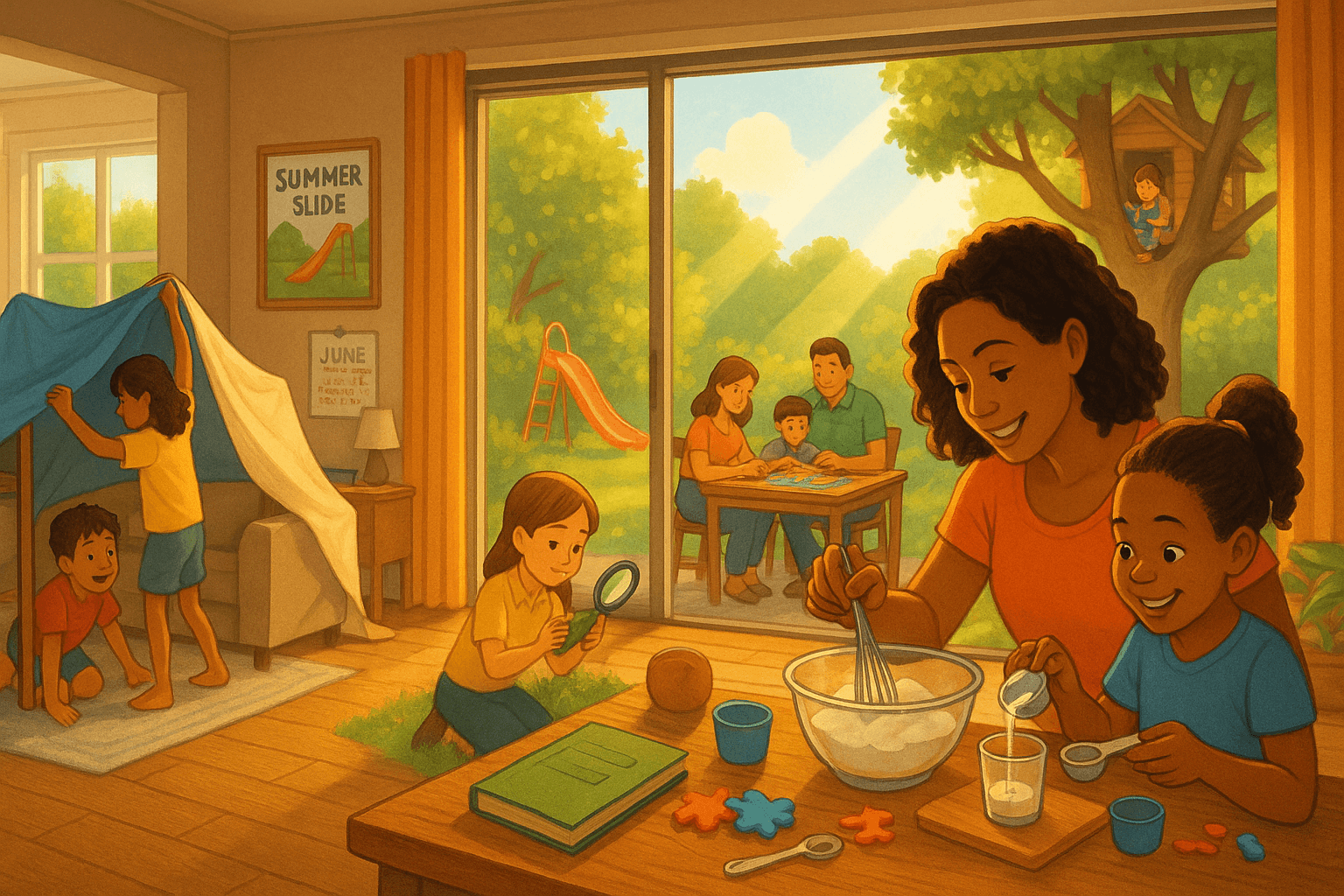
Turn Cooking into a Maths & Science Lesson
Your kitchen is the best classroom, especially during winter break or summer vacation. It’s a great way to avoid summer slide and boost holiday learning activities. It’s an engaging way to teach Maths, Science, writing skills and focus without pressure. Cooking offers a hands-on, fun experience that doubles as one of the most effective fun holiday learning activities, promoting kids learning and its a great opportunity to bond with children. Best of all, it teaches a lot without feeling like a lesson.
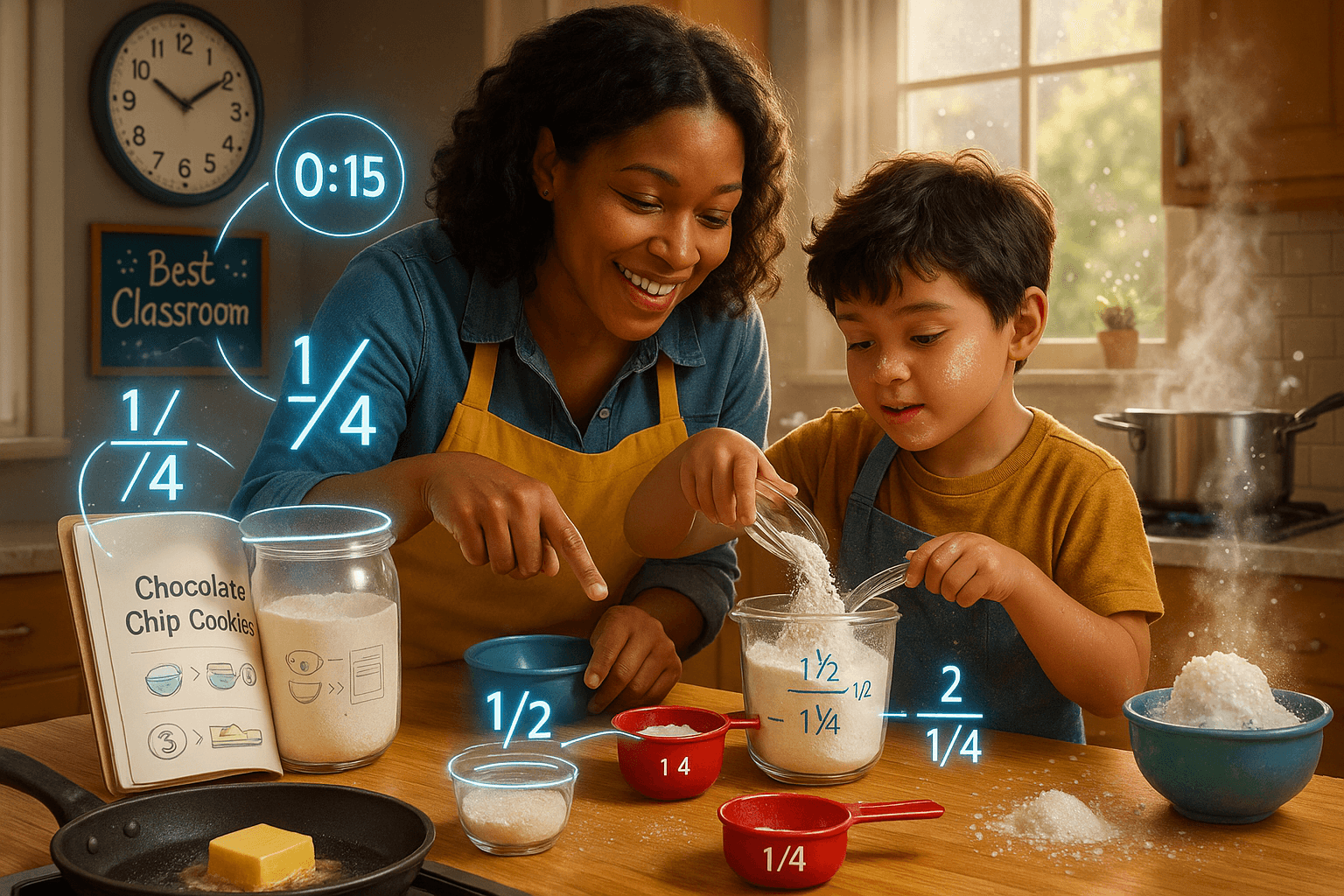
✅Practice fractions, ratios & Time: Measuring flour turns into a fun game. It’s an engaging way to build real-world math skills. Doubling a recipe highlights ratios and multiplication. Kids can ask, “If we need half a cup and only have a quarter, how many scoops do we need?” Setting a timer for cookies at a holiday party or summer afternoon helps kids improve their time management skills. This fun way of learning makes cooking a joyful experience. It helps students build skills and focus better without any pressure.
✅Ask yourself: If we need half a cup but only have a quarter cup, how many scoops do we need? The recipe says 15 minutes, but we started at 2:45. When should the timer go off?”. These everyday questions build essential math skills in a holiday season context. Now is the ideal time to build problem-solving skills and critical thinking.
✅Explore changes in matter: Watching water boil turns from liquid to gas. Seeing ice melt changes it from solid to liquid. A baking soda and vinegar eruption shows a chemical reaction. These activities make Science come alive. Talking about solids, liquids and gases in real-world terms enhances learning. Ask, “Why did the cake rise?” or “What happened to the steam?”
✅Learn sequencing and procedural thinking: Following a recipe helps kids understand sequences better. Have them read the steps out loud to improve their reading skills and literacy. This approach teaches them about procedures, so they learn about cause and effect, order and responsibility. During winter breaks or enjoyable holiday mornings, they can build skills with little effort. They need to follow good habits in their daily routine.
Activity
Key learning outcomes
Holiday engagement tips
Fractions, Ratios & Time
Builds real-world math skills, critical thinking and problem solving through tasting and time calculation
Let's make Grandma's holiday cookies. If the recipe needs ¾ cup sugar but we only have a ¼ cup measure – how many scoops do we need more?
Science of matter changes
Cooking enhances cognitive skills and supports math and science knowledge
Watch butter melt (solid→liquid) for pie crust
Sequencing & Procedures
Literacy skills,
sequential logic & problem solving, focus and task management
Make layered holiday trifle: Which step comes first – custard or fruit?
Life skills & independence
Letting kids stir, pour, clean, taste
Strengthens mental health, family bonding, healthy eating habits, self-efficacy
Explore Nature with Learning Walks
Step outside for some holiday fun holiday learning activities. A quick walk around the block, a stroll in the park, or just looking at your backyard can turn into a fun adventure for kids. Nature walks are fantastic educational activities during school free time. They get everyone moving, promote good mental health.
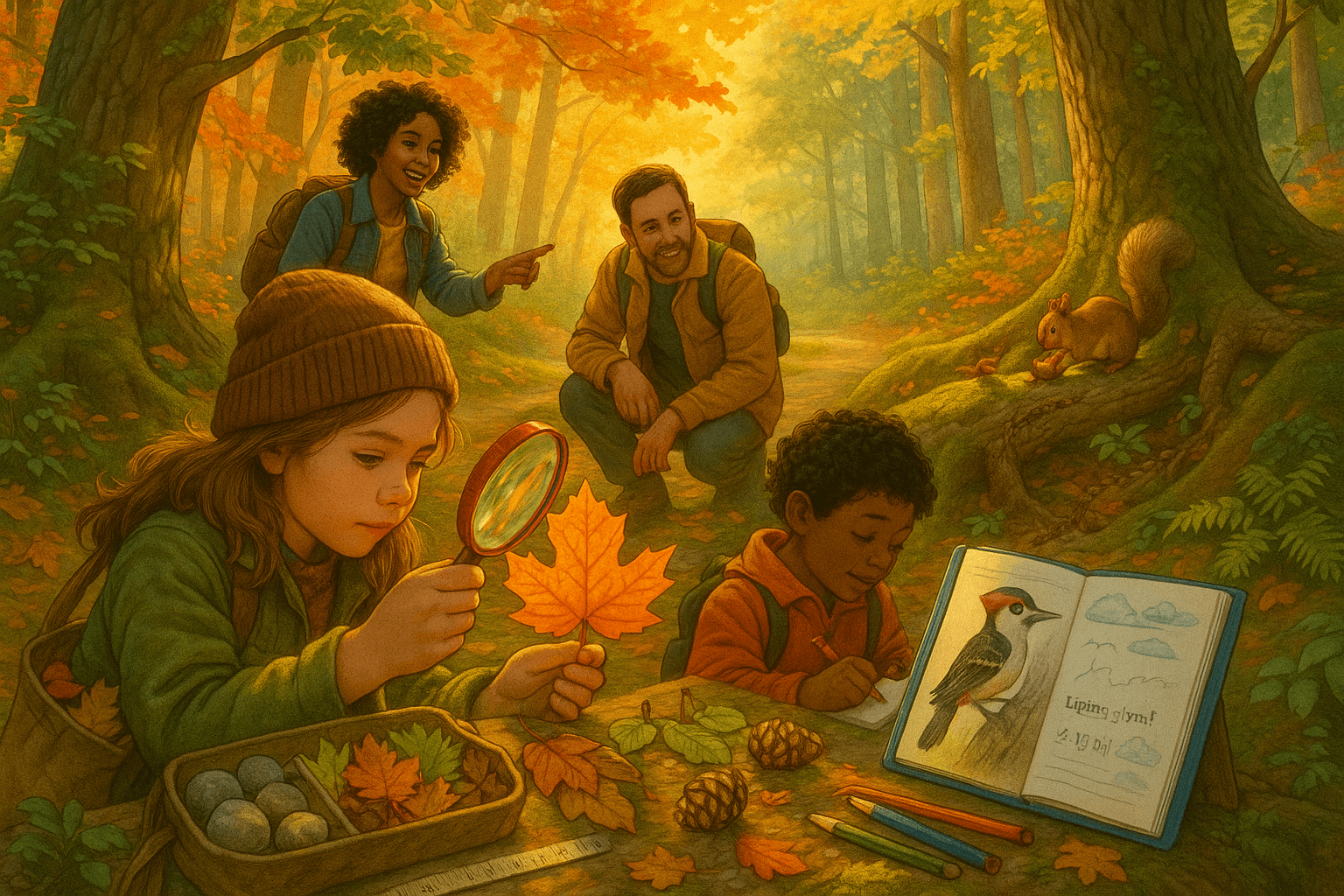
✅Spot patterns & collections: Look for patterns in leaves, flower petals, or insect wings. Collect different types of leaves, stones,etc. Sort them by size, color, shape, or texture. This enhances observation, classification, and early math skills, turning simple exploration into a fun game with real purpose, perfect for a casual holiday party or solo travel time.
✅Keep a mini nature journal: Bring a small notebook and pencil. Encourage your children to draw what they see like a bird,a bug or a cool cloud. Write down one word, a short phrase, or a question about it. This combines artistic expression with early writing skills and curiosity.
✅Ecosystems change with the seasons: For instance, notice how the trees shift colors for winter. The leaves turn vibrant shades before falling. This signals the arrival of colder weather. Look at the landscape, it transforms beautifully. Animals also adapt, finding shelter and food in new ways.
Each season brings unique changes to our environment. Where do you think that squirrel lives? What do you think these ants are carrying? Talk about the season, weather patterns or how plants and animals adapt. It’s an easy way to teach about the environment and science around the world.
Idea | Description | Educational benefits |
Spot patterns & collect | Walk in yard or park, gather leaves, stones. Sort by size/color/texture | Builds observation, math skills, critical thinking & problem solving |
Mini nature journal | Kids draw a bird, bug, or cloud. write a word, phrase, or question. Combines artistic expression, early writing skills | Supports writing and literacy skills, creative thinking and reflection |
Explore seasonal change | Observe tree colors, animal behaviors (like squirrels, ants). Ask questions like: Where do they live? What are they carrying? | Teaches science, seasons, adaptation and global environment awareness around the world |
Mental health boost | Fresh air, physical activity and curiosity reduce stress. Just 15 mins outside can enhance mood, focus and overall mental health. | Strengthens mental health, attention and social interaction |
Creative Arts & Crafts for Self-expression
Shut down the screens for a while. Pick up glue and paper. Arts and crafts let children grow their fine motor skills. They spark creativity, artistic expression, and also help with concentration and problem-solving, making them do productive activities. They provide a screen-free way to express energy and emotions. This is important for mental health, especially during unstructured holiday activities.
✅Themed projects: Connect projects to the season or your children's interests. Build a model volcano for science. Create a solar system mobile to explore space. Design holiday cards or make greeting cards for friends and family.
✅Storytelling: Move beyond static crafts. Create simple puppets and put on a show. Draw a comic strip telling a story. Create characters and settings. This builds narration, literacy skills and creativity. Encourage them to narrate their story aloud.
✅Use recycled materials: Cardboard boxes, toilet paper rolls, bottle caps and old magazines are valuable. Challenge your kids to create something new. It encourages sustainability and sparks creativity. People ask, “How do I attach this?” It also helps develop critical thinking.
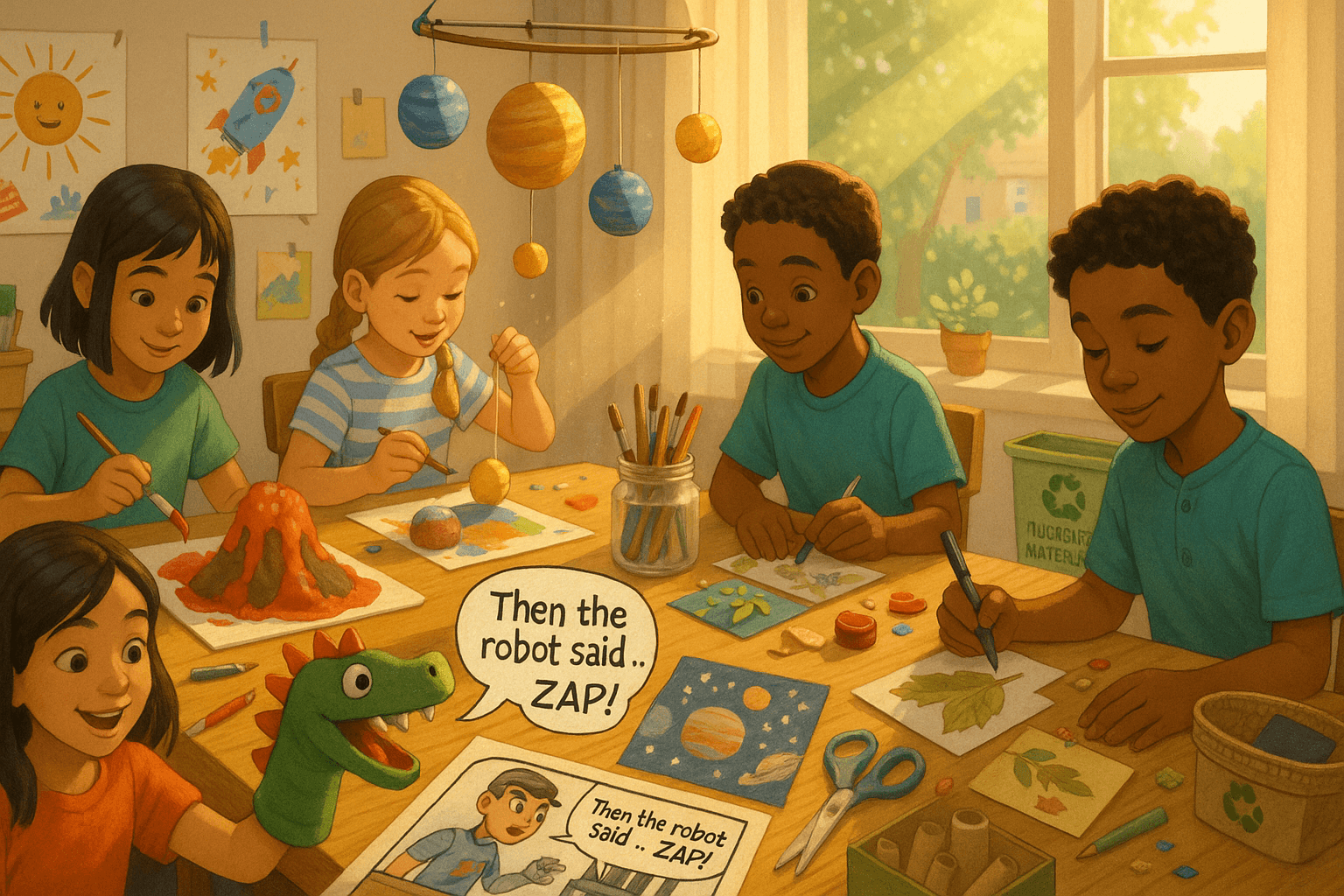
Learning Through Games & Puzzles
Games are the ultimate stealth learning tool. Favorite holiday games and puzzles entertain kids for hours. They also sharpen cognitive thinking, memory, logic and problem-solving. They teach sportsmanship and strategy. This makes them great for family game night or small groups of friends.
✅Board & card games: Classics are classics for a reason. Games like Scrabble build vocabulary and spelling skills. UNO reinforces color and number matching. Chess is pure strategy and critical thinking. Play an old favorite or discover a new one. Many games offer holiday themed versions too.
✅Puzzles & Logic challenges: Jigsaw puzzles boost spatial reasoning. Printable logic grids, sudoku, puzzle books, like crosswords and word searches are perfect for quiet time. They also help build literacy skills and improve focus.
✅STEM Toys & Building kits: Blocks, Lego, K'Nex, and math card games like "War" with multiplication are great choices. They use engineering skills, planning and experimentation. Plus, they apply math skills in a fun and interactive way as they engage students deeply.
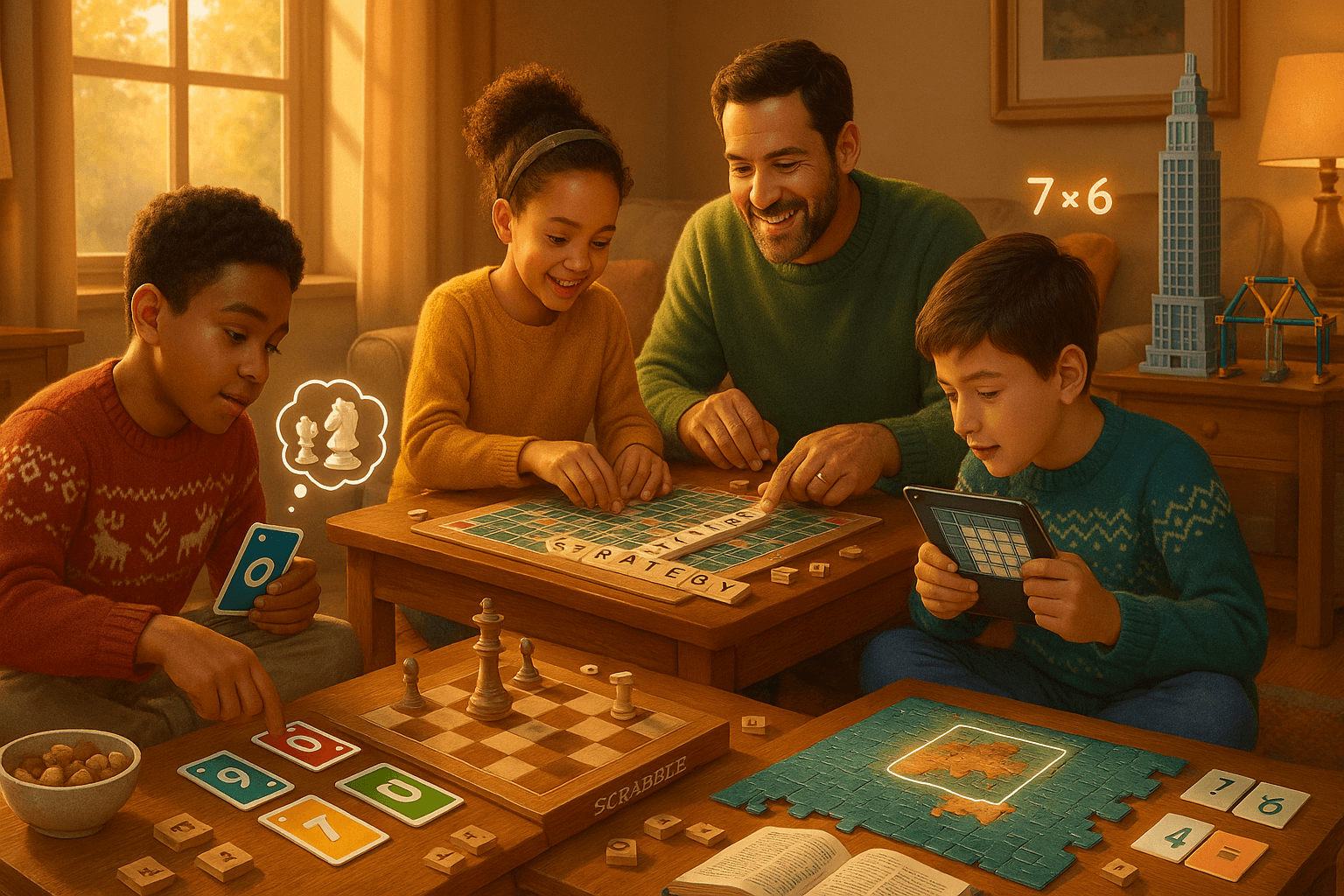
Read, Write and Tell Stories Together
Holiday breaks are a great chance to encourage a love for reading and writing. During the winter holidays, there’s no pressure from school assignments. Diving into stories increases vocabulary, comprehension, imagination and empathy. It’s also a wonderfully calming activity, great for mental health as we approach the new year.
✅Read together: Read and share books. For older kids, start a mini family book club, read the same book and discuss about it. Visit the library and let them choose books that match their interests. Consistent reading prevents the summer slide.
✅Spark writing: Encourage them to create as the options are endless. You can keep a holiday diary, write a short story, or draft a blog post about a holiday activity. You might even write holiday cards with personal messages. This builds writing skills, grammar awareness and creativity. Offer free resources like story starters if needed.
✅Tell stories aloud: Use simple apps to make digital storybooks. Record voice notes to narrate an adventure. You can also create stories together during car rides. This builds literacy skills, sequencing ability and expressive skills in an engaging way. It’s pure artistic expression with words.
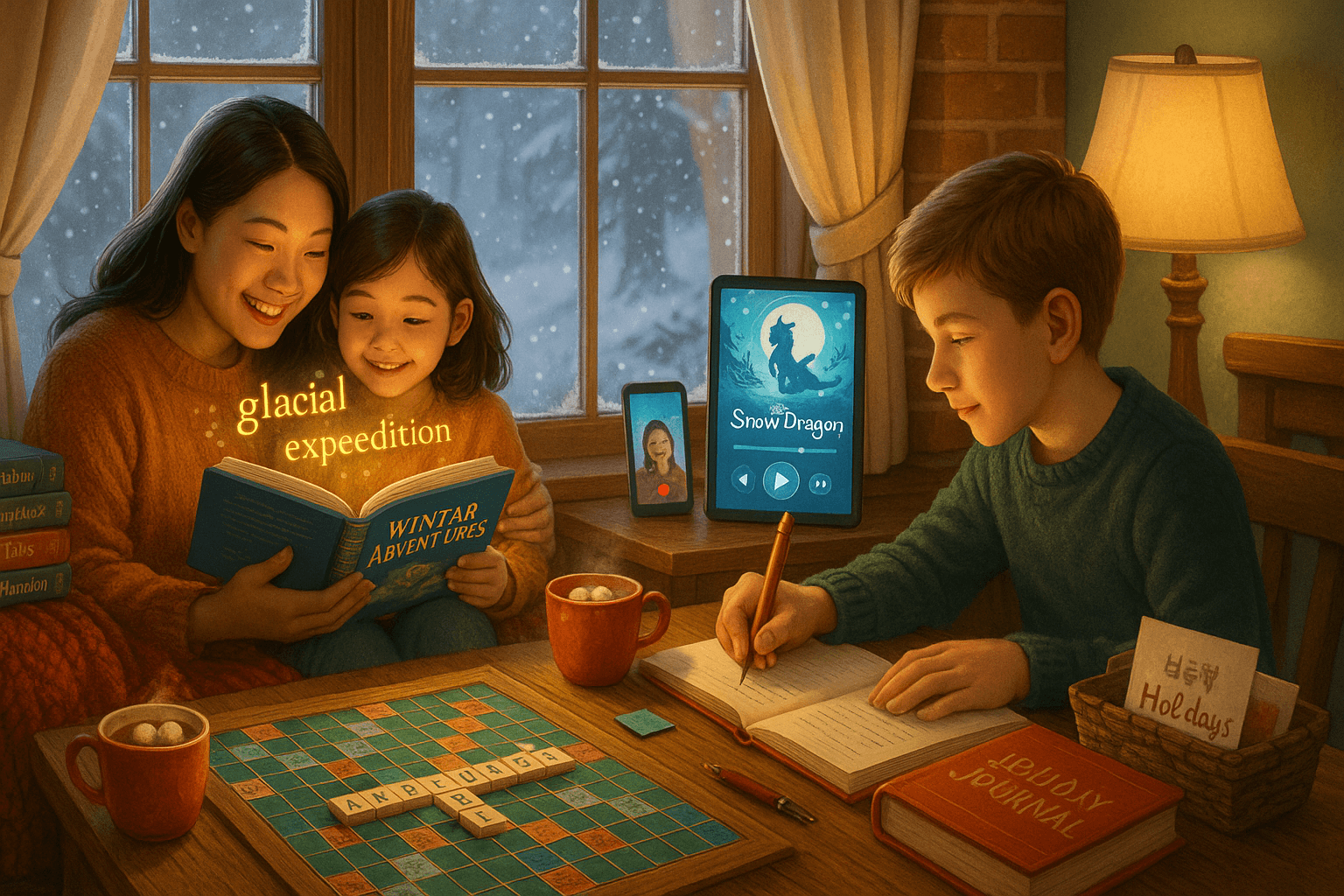
Conclusion
School holidays, including winter and summer breaks, are important for relaxing and resting. But they are also a great opportunity for a different growth dimension. Utilize these holidays for learning activities that help in the development of skills.
Forget the stress of school, focus on play, creativity and quality time with family. Try productive holiday activities for kids like cooking together using math and science, or taking nature walks as educational activities during school break. Step outside and explore the world around in your neighborhood. Engage in art and storytelling. Play brain-challenging games and share the joy of reading and writing.
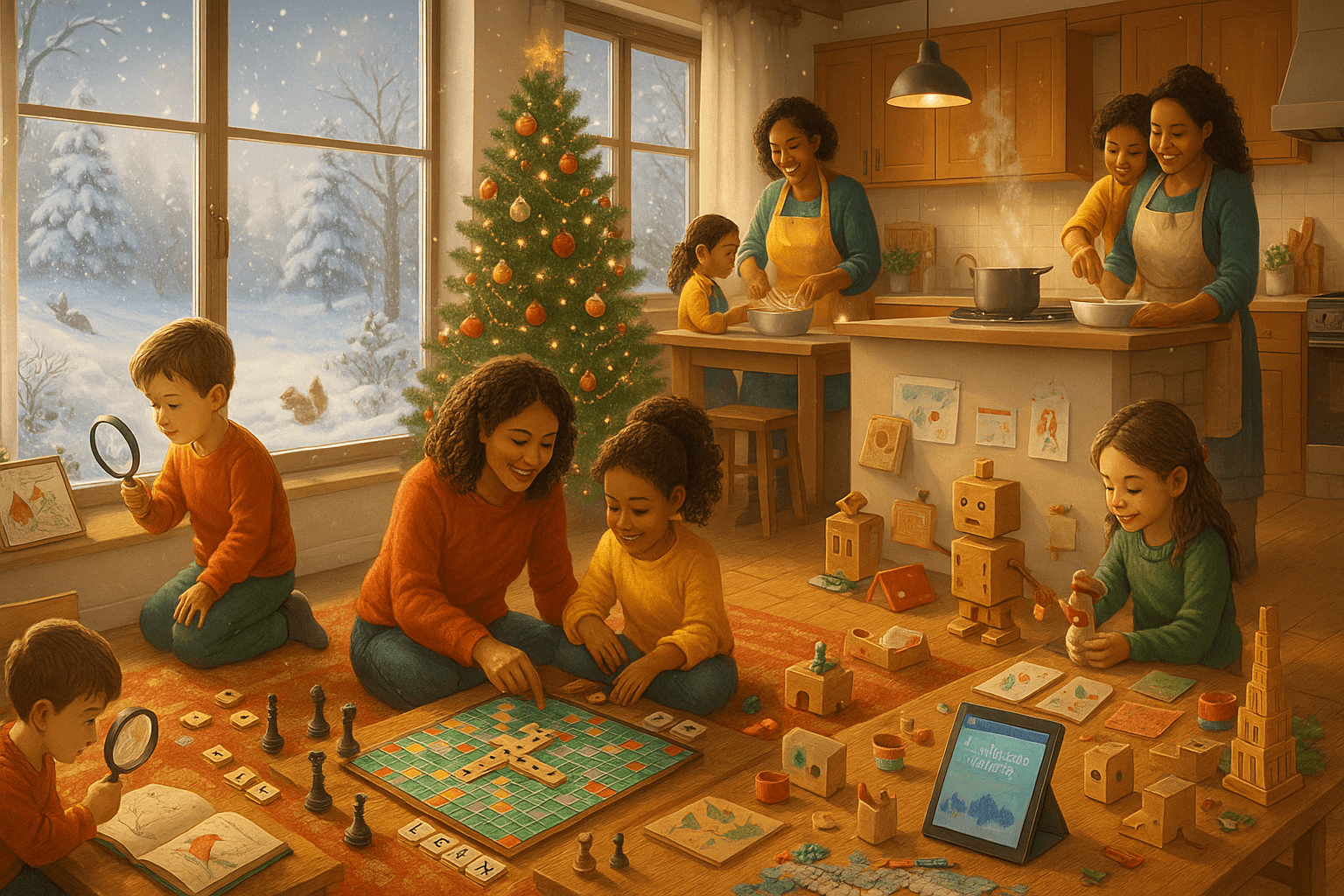
These fun holiday learning activities engage your wonderful kids without stressing parents.They strengthen family ties and the spirit of community among the classroom from home. They sharpen cognitive skills, critical thinking, problem-solving and creativity. They do this in a fun way while keeping the holiday spirit alive.
School Holiday Activities – FAQs
What are some stress-free educational activities kids actually enjoy?
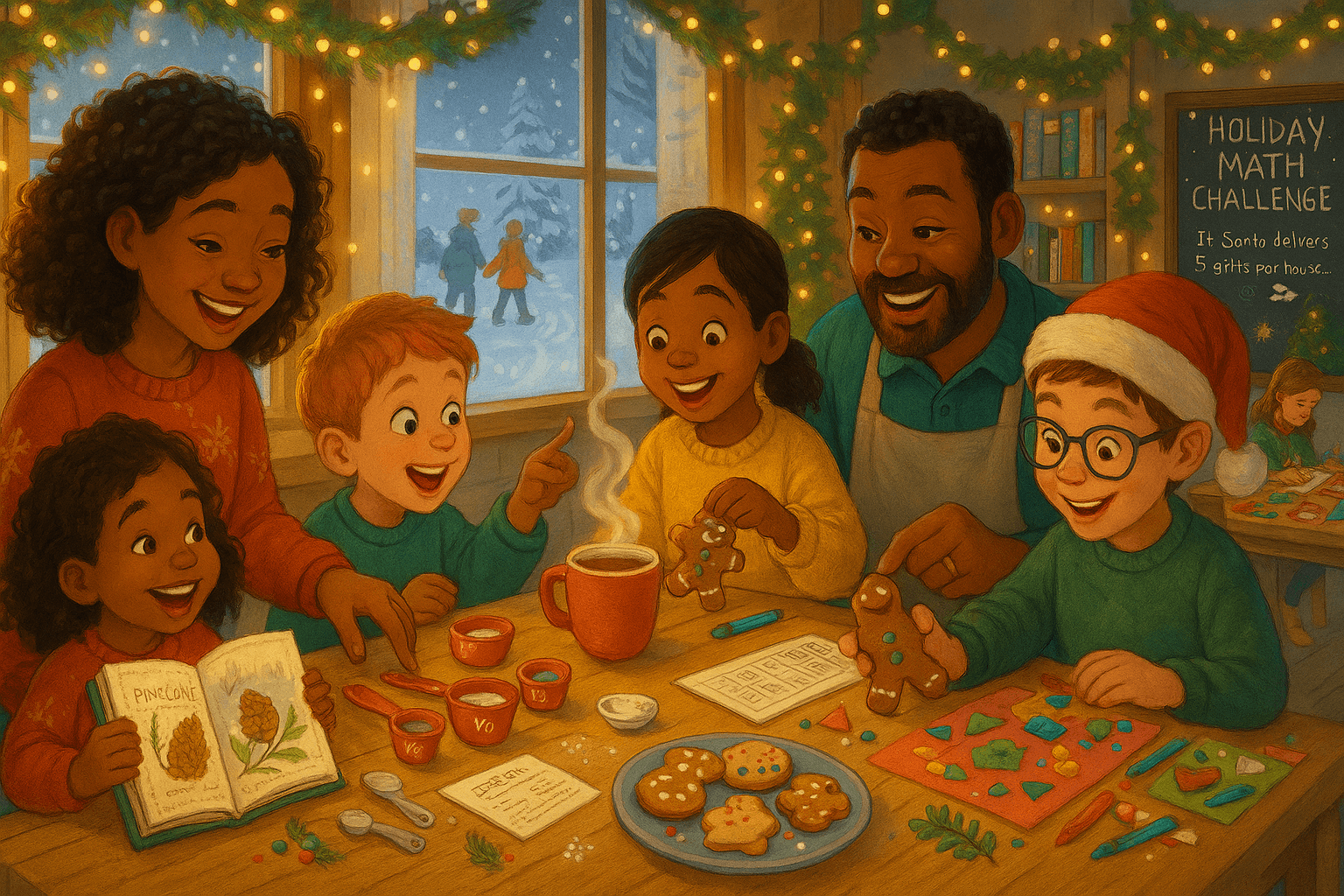
Kids enjoy on holiday learning activities that feels like play, not a class. Engage them with favorite holiday games, simple crafts or nature walks. Cooking projects sneak in math skills, while writing holiday cards builds writing skills. These low-pressure fun holiday learning activities spark creativity and problem solving, turning winter or summer break into joyful learning. It’s quality time that strengthens family bonds without stress.
How do I create a balanced holiday routine that includes learning?
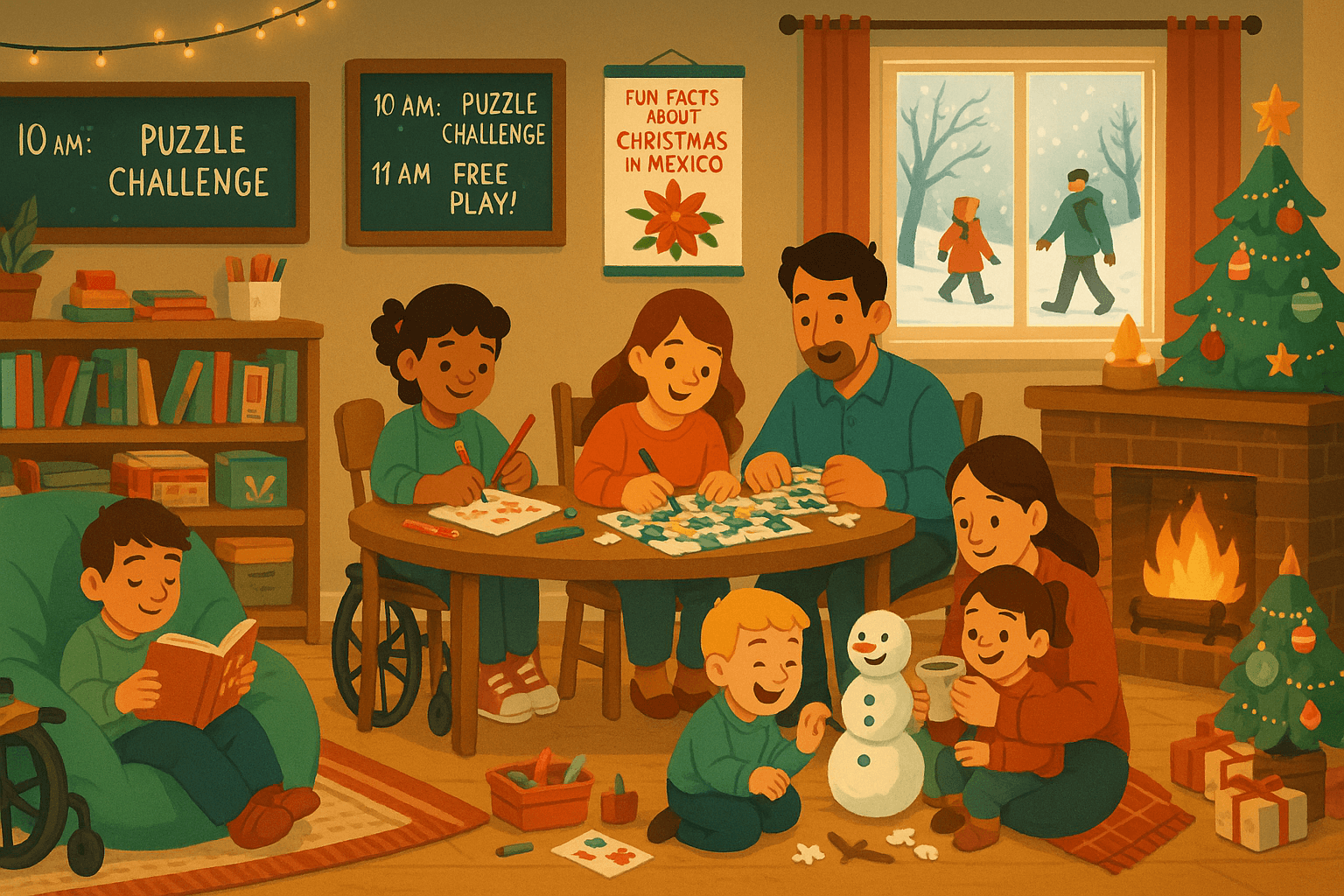
Combine 1-2 brief learning games for holidays such as a fun facts session or a quick puzzle, with ample free play time. Set up easy learning spots at home. Create a reading corner, an art station or a building zone. Let kids choose what they want to do. This balance helps protect their mental health, prevents burnout and makes the holiday season fun. Use resources like printable holiday games or facts about different cultures.
What low-prep activities can working parents rely on for learning?
Select engaging, independent activities. Try audiobooks for reading, math apps for learning or science kits for fun. Printable holiday cards and "around the world" trivia sheets boost writing skills and global awareness. These easy options keep kids busy. These productive holiday activities for kids help build critical thinking skills and prepare them for the coming year and you can still focus on work.
How can I tell if my child is actually learning through holiday activities?
Watch for real-world applications. Do they measure ingredients (math skills)? Explain a craft’s steps (focus & vocabulary)? Suggest new rules for a game (problem solving)? Notice improved reading fluency or curiosity about holiday traditions. True learning shows in their ability to use new ideas, not just finish tasks.
How can holiday learning activities prepare kids for the next school term?
Regular practice never stops skills from fading. Games reinforce math, critical thinking and writing skills. Exploring holiday traditions that boosts cultural awareness. Kids come back to class feeling confident, having been involved in examining challenges. They keep what they've learned and see learning as fun, not a task.
What role do parents need to play in holiday learning?
Be a resource provider and cheerleader, not a teacher. Give them a chance to explore engaging activities like games, arts,etc. Join in sometimes for fun, make a holiday card together or play a quick round of an old favorite game. Follow their interests: if they love dinosaurs, find holiday-themed dino facts. Your support makes learning enjoyable.
Comments
Your comment has been submitted